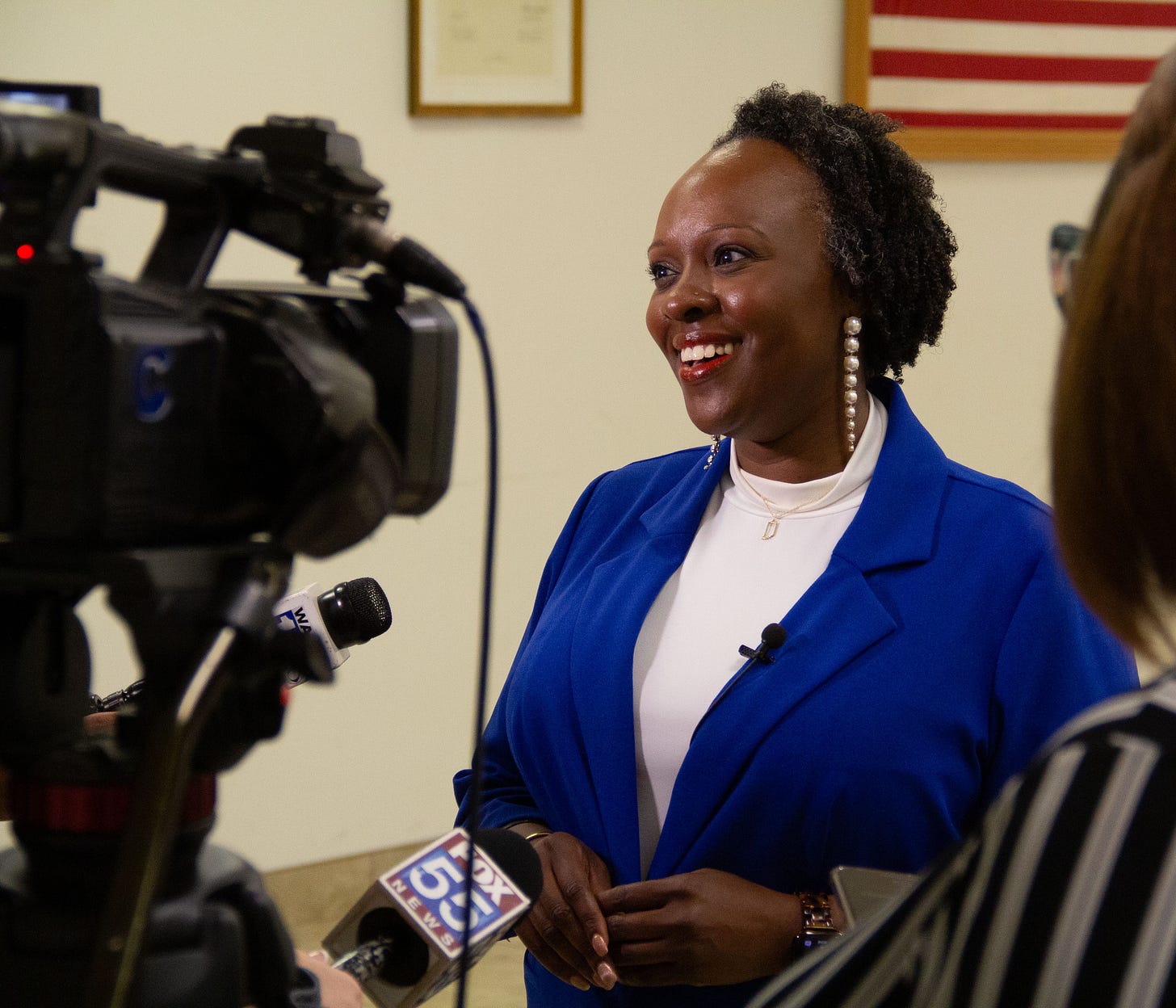What it’s really like to be on Fort Wayne City Council
New representative Rohli Booker’s life is about to change, say current Democratic council members

At last night’s Fort Wayne Community School board meeting, Rohli Booker officially resigned her position as vice president and District 4 representative. That move was necessary because Indiana state law prevents a person from being a school board member and city council representative at the same time.
Booker will be sworn in as the 6th District representative on Fort Wayne City Council by Mayor Sharon Tucker in a ceremony at 12:30 PM today at Citizens Square. When that occurs, she will join just two other Democrats who also serve on City Council: Geoff Paddock (5th District) and Michelle Chambers (At-Large).
Both Paddock and Chambers attended the caucus on Saturday and approached Booker after her win to offer help in getting up to speed as a City Council member.
They also spoke with me about what life is really like when you’re on City Council, and what their newest colleague should expect.
A big time commitment
Like Booker, Paddock was a Fort Wayne Community School board member before being elected to City Council. He said Booker will benefit from having served in another legislative body and noted that FWCS’s budget is actually larger than that of the City of Fort Wayne.
“That’s good training,” Paddock told me, but he also said that when he made the same transition, his workload increased significantly. Being a school board member required “five to ten hours a week” of work outside of their every-other-week meetings. As a city council member, “I’m up to about 30 hours a week now,” he said.

Chambers agrees. “We’re hired to be part-time city council members, but it is a full-time commitment,” she said. “There is a lot of work that goes on behind the scenes before you get to City Council on Tuesday.”
One of the biggest reasons for that is the time required by City Council committees.
“If you’re a chair of a committee or a co-chair of committee,” Chambers told me, “everything on that agenda, you should have done your due diligence [on], met with the department head, met with the staff, [and] have a great understanding of what you’re voting for so you are secure in your ‘yes’ or your ‘no.’”
Simply reading through each proposed ordinance can take up a significant amount of time as well, according to Paddock. “Sometimes there’s 60-some pages,” he said, “but still you go through [it] and you want to know exactly what it says and what you’re doing.”
Chambers told me that the time requirements increase during the weeks they’re working on the city budget. “You could literally have a meeting every day, Monday through Friday, if your schedule permits.”

Solving constituent problems
In addition to voting on proposed city ordinances and serving on committees, council members are also expected to help constituents who have issues with the City of Fort Wayne.
Paddock said that representing a specific district — rather than being an at-large member — means Booker will likely get a sizable number of phone calls and email requests from the people she serves. “You have a lot of constituent issues that you deal with,” he said. “In fact, I was dealing with something this morning before I came here [to the caucus].”
He also told me that Booker’s public profile will rise now that she’s on City Council, which means she’ll probably get recognized in public much more often than when she was on the school board.
“People see us, they know us, and they know that they can approach us with an issue, whether it’s just information on something or a problem like I was trying to solve at about a quarter of nine this morning,” he said.
Entering a partisan world
In Indiana, school board races are nonpartisan. That meant Booker did not have to worry about partisan politics when working with her FWCS board colleagues.
That isn’t the case on Fort Wayne City Council. Republicans hold a 6-3 majority, requiring Booker and her fellow Democrats to secure Republican support to pass anything.
Navigating those partisan politics is another requirement in order to succeed as a City Council member.
“Bottom line, you have to build relationships,” Chambers told me. “You have to find common ground that you all can relate to and anchor to. You have to get in partnership with [Republicans].”
Paddock acknowledged the partisan divide but said he didn’t think it would be a roadblock to Democrats passing key ordinances. “We have a good rapport with our Republican friends on City Council,” he told me. “We all work together, I think, very well.”
Chambers agreed. “Yes, we are Republican. Yes, we are Democrat,” she told me. “But we work for the people.”


